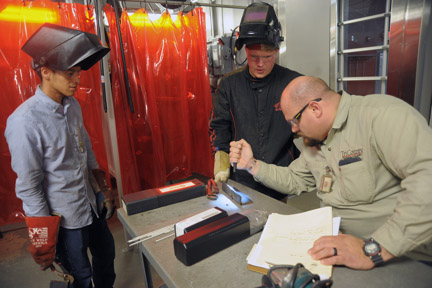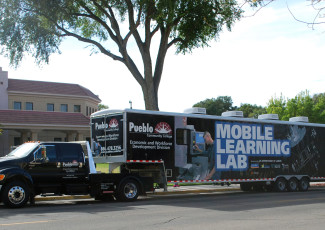Workforce Development Continues in South Carolina
By Rebecca L. Weber
January 19, 2016
How one technical college puts students on the path to college, apprenticeships and careers.
With just more than 6,500 students, Tri-County Technical College (TCTC), in South Carolina, is a relatively small community college, but it’s having an impact on pathway programs that lead students to higher education and careers while supporting the community’s workforce.
“It’s our desire for every student to have a transformative student experience,” says Ronnie L. Booth, president of the college. The programs that help students discover a path they want to pursue in college and in their career are having great success. But he is amused by the fancy-sounding name of their Technical Career Pathways program. “Quite honestly, it’s dual enrollment with a twist,” he says.
This January marks the program’s sixth semester. Working with the local public high school districts, TCTC identified seven students for the initial pilot three years ago. They enrolled in college classes while they completed high school and continued to study at TCTC in the summer term. Six of those students finished the program and received industrial electronics certificates.
After earning certificates, most of the students were hired by local companies, but two of the graduates were selected for full-time, two-year apprenticeships in Germany. Once the apprenticeships are completed, the graduates will return to South Carolina to help set up American offices. “They’ve never been on a plane before,” says Booth of the two young men. “Every time a student does [something like] that, it opens the eyes of another student.”
Building on the success of those six students, the technical career pathway has since been opened to 166 students preparing for employment in specialties such as mechatronics.
“There’s a lot of opportunity. We think our job is to introduce students to opportunities they never anticipated.”
Apprenticeship programs are a win-win
Many community college students work while taking classes, but the jobs are often unrelated to what is being studied. “Wouldn’t it be nice,” asks Booth, “if they could work in a career-related field and start building their resume?”
Booth says South Carolina’s apprenticeship program, which offers employers a $1,000 tax rebate and is certified with the Department of Labor, is the strongest in the country.
At TCTC, the apprenticeship program has grown to include ambulance drivers, customer-service reps, pharmacy technicians and even TCTC employees. Hundreds of students have been placed with dozens of companies.
“We say to employers, ‘Maybe you can’t take full-time [workers]. Maybe you can take part-time [employees]. You can try them and they can try you,” Booth says. In trying to meet workforce needs, apprentices get trained and improve their skills. Some even get credit.
Helping to train the workforce
TCTC’s system trains South Carolina companies — for free, via ReadySC — that are adding new employees. “It’s one thing to get people ready for their first job with Bosch or BMW, but what about in five years? What happens when they are ready to go to the next level? If they have good, skilled people, we get them to the next level, rather than them having to hire off the street,” says Booth.
For example, Booth says most of the engineers at Square D have a two-year degree from TCTC. But thanks to continual training, they function as engineers at work.
“It’s one thing to get a successful company up and running, but it’s much harder to keep it going,” Booth says. “[We ask], ‘What are your needs and how can we help meet them?’”
AACC’s Workforce Development Institute, Jan. 20–23, will continue the conversation. Learn more.
Photo courtesy of Tri-County Technical College









